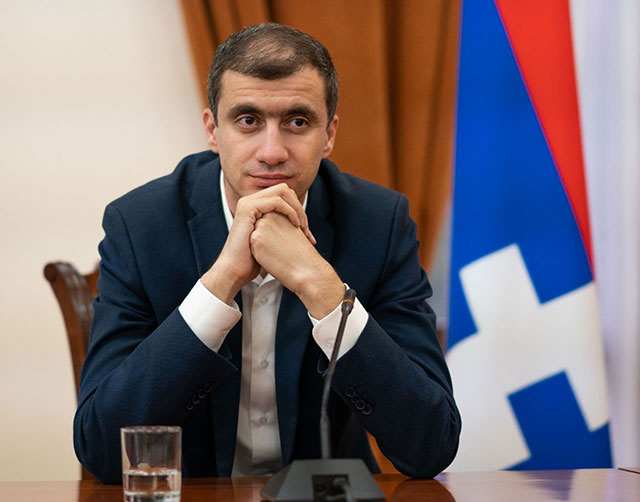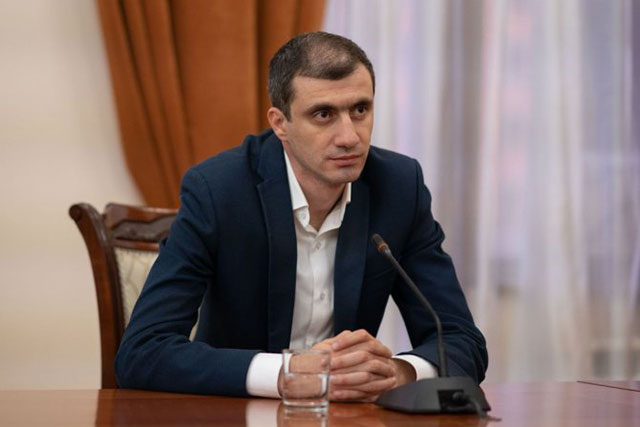by Krikor Amirzayan
Exclusive Interview with Mesrop Arakelyan, Advisor to Artsakh State Minister Ruben Vardanyan
Read also
Mesrop Arakelyan, adviser to the Minister of State of Artsakh, Ruben Vardanyan and co-founder of the party ” Aprelu Yerkir ” answers questions from ” News from Armenia Magazine ” on the situation in Artsakh.
– News from Armenia Magazine: Mesrop Arakelyan, you are the adviser to the Minister of State of Artsakh, Ruben Vardanyan, and the co-founder of the “ Aprelu Yergir ” (Land of Life) party. Can you tell us a few lines about your background ?
– Mesrop Arakelyan: The creation of the “ Aprelu Yergir ” party was based on the post-war situation in Armenia and Artsakh, because after the war, the challenges surrounding the two Armenian states completely changed the reality we were in. My colleague Mané Tandilyan and I considered the creation of the party as one of the tools that would allow us to face the challenges with more responsibility.
Before founding the political party, immediately after the war, I held the post of Minister of Labor and Social Affairs of Armenia, and Mané Tandilyan the same post in Artsakh. At that time, our common work was aimed at quickly overcoming the post-war social problems in Artsakh. Even after resigning from the post of minister, we did not miss any opportunity to be at the side of Artsakh.
Even now, we consider it very important that Ruben Vardanyan took the post of Minister of State of Artsakh. And my move to Artsakh and my integration into its team aims to more effectively fulfill our responsibility to Artsakh.
NAM : What are the consequences of Azerbaijan’s blockade of Artsakh today ?
– Mesrop Arakelyan: Unfortunately, after the war, Azerbaijan’s anti-Armenian hate policy towards Artsakh and Armenia, as well as the manifestations of military aggression, indicate that at least today we are quite away from the possibility of peaceful coexistence with Azerbaijan as neighbours. Therefore, the incident that happened, the blockade of Artsakh, did not come as a surprise to us. Bringing another false pretext, Azerbaijan pursues a policy of ethnic cleansing and reduction of the Armenian population in Artsakh. It was surprising for many people, including Azerbaijan, that after the war 120,000 people, who had not lost their homes, returned to Artsakh. Moreover, part of the displaced persons returned to Artsakh at this time.
Right now, for more than two weeks, the road connecting Artsakh to Armenia and the world is closed. It causes serious humanitarian and social security problems. In particular, dozens of citizens are sick, in extremely serious condition and cannot receive proper care, as there is also a problem with transporting medicines. Fuel and food are also consumed at a fairly high rate.
Despite the situation created, the people of Artsakh continue to stand firm and fight for the right to live on their land. On the other hand, however, it must be admitted that the problems are getting worse day by day and are placing the people of Artsakh in the face of a humanitarian crisis. And against the background of the inappropriate reaction of the international community, Azerbaijan continues the blockade of Artsakh.
– NAM : Do you feel that the international community is reacting strongly to the issue of the blockade of the Lachin corridor and the isolation of 120,000 Armenians in Artsakh ?
– Mesrop Arakelyan: From the point of view of current affairs, we can consider that the international community has been quite active. There are announcements and a series of appeals addressed to Azerbaijan by various international structures and countries, but it is painful to note that the world has not been able to ensure peace and the protection of rights of man with these calls for a long time. Regardless of the political situation created around Artsakh, political or legal discussions on the status, it must be taken into account that 120,000 people in one part of planet Earth are under siege and need humanitarian support, and in this situation the international community should not be political or make legal recourse,
– NAM : Has the arrival of Ruben Vardanyan as Minister of State of Artsakh been beneficial and dynamic for Artsakh ?
– Mesrop Arakelyan: Ruben Vardanyan’s care and dedication to Artsakh is nothing new. For more than 20 years, he has been implementing quite serious projects in Armenia and Artsakh. Even now, assuming the office of Minister of State is only a continuation of his activities. During the 44-day war and after the war, Ruben Vardanyan repeatedly spoke about the importance of assuming greater responsibility around Artsakh and the need to meet existing and expected challenges with greater resources. And today, indeed, Ruben Vardanyan is fully committed to solving the existing problems.
Among the people of Artsakh, the leadership of Ruben Vardanyan has created a certain positive environment and, I am sure, it is also important from the point of view that it is presented that the strengthening of Artsakh and the challenges to take up is not a problem of Ruben Vardanyan or a few officials. Thanks to the joint efforts of the whole world and also of the Armenians, we can achieve this and it is very important that the confidence in Ruben Vardanyan can create a great opportunity for a united struggle.
– NAM : What do you expect from the Armenian Diaspora ?
– Mesrop Arakelyan: Attitudes and expectations towards the diaspora have always been very different and have always given rise to different interpretations. We have to be honest and note that our Diaspora is quite multi-layered. There are millions of compatriots who have never returned to their homeland, most of them do not know the Armenian language, or do not understand it, cannot speak it, etc. And so, having a non-homogeneous diaspora, we cannot expect there to be uniform and coordinated formats of cooperation or support.
However, this is not a problem or a weakness, but an opportunity for us. The multi-layered nature of the diaspora allows for cooperation in different areas and in different formats. Of course, even now,
It is important that our compatriots in the diaspora consider Artsakh and Armenia as their country as those who live there consider it, and do not participate in the implementation of various programs in support of our request, but take the initiative to implement various programs themselves and bear the responsibility for it. For this, Armenia and Artsakh must open up fully to our compatriots in the diaspora and leave them the freedom to act.
Interview conducted by Krikor Amirzayan (News from Armenia Magazine) on December 29, 2022 with the help of journalist Hripsimé Hovhannisyan


























































